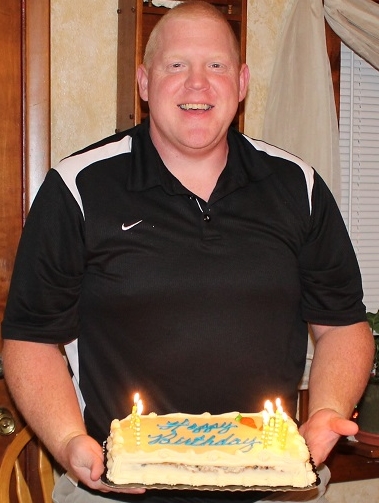Why Bariatric Diet Plan?
Hello, my name is Austin Elling the founder of bariatricdietplan.com. The whole idea behind the site came after I had a gastric sleeve procedure in May of 2016. After battling with weight my entire life I decided to go ahead with the surgery to improve my health and improve my long-term wellness. At a pre-surgical weight of 316 lbs. I wanted to achieve a weight-loss goal of at least 75% of my excess weight.
The surgery went smoothly and after a few days in the hospital, I returned home to begin my recovery and adjust to the new normal that was my smaller stomach. After the initial few days the majority of the pain and bloating subsided but I found it increasingly hard to intake the number of liquids and protein that was recommended as part of the post-surgical recovery diet. Not only was the liquid diet very restrictive (for good reason) but it was also very bland and monotonous. Because I didn't particularly like drinking water and sipping protein shakes, I found myself falling short of my liquid and protein intake goals and feeling sluggish and tired because of it.
After slogging through the initial 2-week liquid diet I was thankful to graduate to the pureed food meals. This diet at least would provide more options making me want to eat a little more to keep up my energy and also keep me on track healing my stomach. The pureed diet was much better but for the next two weeks, I found the options here also very limiting and after just a few days found myself detesting the repetitive food choices and not knowing if there were other options. The limited options also tempted me into trying to introduce foods back to my stomach before it was ready, risking not only stomach discomfort but also potential harm if something would happen or cause undue stomach distress.
 After thankfully making it through the pureed stage I was extremely ready for the soft-food meals. Now being able to eat a wider variety of foods I was finally able to start regaining some energy and also intake enough protein to maintain muscle mass. Still, the constricted menus were less than desirable and made me long for more options that would help me make an easy transition back to whole food without going on a food binge or return to old eating habits.
After thankfully making it through the pureed stage I was extremely ready for the soft-food meals. Now being able to eat a wider variety of foods I was finally able to start regaining some energy and also intake enough protein to maintain muscle mass. Still, the constricted menus were less than desirable and made me long for more options that would help me make an easy transition back to whole food without going on a food binge or return to old eating habits.
Transitioning to whole foods after surgery was a tremendous milestone. I had already lost around a significant amount of weight at this point and was excited to eat "real food" again but after investing thousands of dollars to better my health I wanted to ensure that I continued my weight loss and have a plan in place to give me long-term weight stability and make sure my stomach healed as well as it could after surgery.
Creating the Diet Plans
Having struggled through the initial post-surgical diet stages and finding limited meal plan resources for bariatric surgery patients as they transitioned to long-term whole food eating I decided to create meal plans that would make this process easier for other patients facing the same obstacles and concerns I had faced.
I started by creating a liquid food diet that incorporated a wider variety of liquid options that would help individuals drink enough water and consume enough protein to feel as good as possible in those first post-operative weeks.
I started by creating a liquid food diet that incorporated a wider variety of liquid options that would help individuals drink enough water and consume enough protein to feel as good as possible in those first post-operative weeks.
Next I created a pureed food meal plan to not only stay within recommended food guidelines to keep your new stomach healing but also provide enough options and diversity of food to help keep food craving to a  minimum and satisfy the desire to eat more "regular" food again.
minimum and satisfy the desire to eat more "regular" food again.
For the soft foods meal plan, I focused on creating a set of meals that would easily transition individuals back to whole foods without introducing too many regular foods back in all at once, giving your stomach and digestive system time to adjust.
For returning to the whole "regular" food meal plans I designed a series of meal plans specifically for bariatric patients and their new food requirements but also taking special care to ensure calorie, fat, protein, and carbohydrate levels were all at appropriate levels to ensure ongoing weight-loss but still provide a range to delicious meals that will provide nutrition and satisfy your tastebuds.
Special Bariatric Meal Plans
After bariatric surgery, I also noticed that certain foods would make me feel ill and/or cause stomach distress in the form of nausea, bloating or diarrhea. These uncomfortable effects I found be common for many bariatric patients and most commonly centered around a few different food groups: dairy products, spicy /acidic foods, and processed meats. Having some of these food sensitivities myself I created some special menus for bariatric patients to make sure in the first few months after surgery they limit these items on the menu and give as much time for their stomachs to readjust to these foods.
My Hopes For Bariatric Diet Plans
My hope in creating these special bariatric meal plans is for individuals is to have a successful after surgery recovery process and to transition into eating habits and meal choices that will continue to support their weight-loss efforts. By using these meal plans I hope to support those who have chosen to improve their health and make the investment in a life-changing surgical procedure. Simple things like planned meals, a variety of foods and making sure you meet post-surgical diet requirements will ensure short term and long term weight-loss success and a better quality of life for your future. It helped me lose a significant amount of weight and keep it off successfully, I hope it can help you as well. Best of luck and let hope you find our resources beneficial an helpful.
*Disclaimer: All results will vary from person to person.

